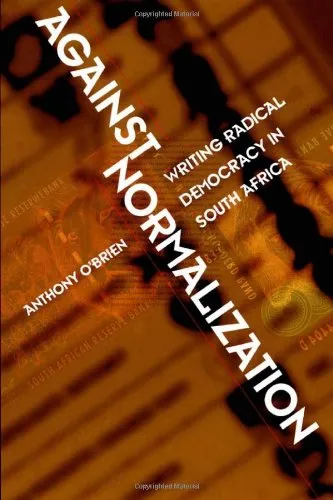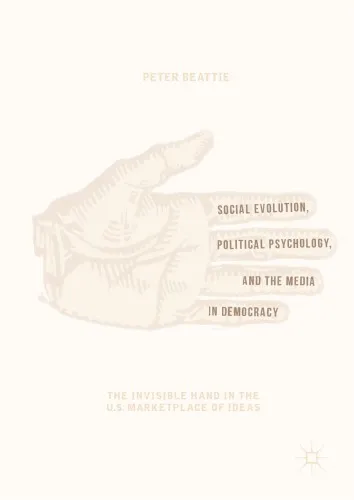Against Normalization: Writing Radical Democracy in South Africa (Post-Contemporary Interventions)
4.0
Reviews from our users

You Can Ask your questions from this book's AI after Login
Each download or ask from book AI costs 2 points. To earn more free points, please visit the Points Guide Page and complete some valuable actions.Related Refrences:
Introduction to “Against Normalization: Writing Radical Democracy in South Africa”
In “Against Normalization: Writing Radical Democracy in South Africa,” author Anthony O’Brien delivers a profound critique of the political and cultural shifts in South Africa during and after the dismantling of apartheid. The book explores urgent questions about what it means to struggle for democracy in a post-apartheid nation, interrogating notions of “normalization” that threaten to obscure radical possibilities for justice and equity. Combining literary criticism, political theory, and cultural analysis, O’Brien deconstructs how narratives from South African writers, activists, and intellectuals have shaped and resisted the concept of “normalization” in the process of building a democratic society.
This book belongs to Duke University Press’s renowned “Post-Contemporary Interventions” series, known for works that challenge conventional thought and promote transformative visions. “Against Normalization” uses South Africa as a vital case study to ask larger questions about the risks of settling into complacency in the face of systemic violence and inequality. By focusing on literature and intellectual work from South African voices, the book offers not just an analysis of historical events but a call to imagine democracy as an ongoing, radical project.
Detailed Summary of the Book
“Against Normalization” is structured around the interplay between culture and politics in South Africa during the transition from apartheid to democracy in the early 1990s. The book critically examines how the end of apartheid, while an unambiguously significant achievement, also introduced the danger of a “normalized” democratic order that might perpetuate existing inequalities in new forms. O’Brien argues that the vision for a truly radical democracy requires constant disruption and questioning of the status quo.
Drawing on literature, political speeches, and cultural texts, O’Brien highlights how South African intellectuals, activists, and writers have articulated competing visions of democracy. From the defiance of township poets to the nuanced writings of anti-apartheid stalwarts like Nadine Gordimer and J.M. Coetzee, the book examines how their works engage with themes of justice, community, and transformation. Across each chapter, O’Brien juxtaposes moments of hope and pessimism, urging readers not to see democracy as a completed project but as a continual process of struggle and imagination.
Significantly, the book critiques the notion of “being normal” in a post-apartheid world—whether in political settlements, in cultural production, or in societal organization. For O’Brien, normalization represents a closing of political possibility, where critical voices are silenced in favor of conformity. By tracing the history of resistance movements and literary interventions, the book reopens a space for radical alternatives and challenges its readers to reject complacency.
Key Takeaways
- Democracy is not a fixed endpoint but an ongoing project of reimagination and struggle.
- Literature and culture are fundamental arenas where the complexities of political transitions are debated and reshaped.
- “Normalization” after systemic oppression can limit opportunities for radical change and reinforce existing inequalities.
- Critical engagement with history and culture is essential in preventing societies from falling into complacency.
- South Africa’s experience offers valuable lessons for global struggles for justice and democracy.
Famous Quotes from the Book
“To call something ‘normal’ is to forget how it was forged—through struggle, compromise, and often, violence. Democracy is no less a process than this, and no less fragile.”
“The danger of democracy is its tendency to mimic the structures it seeks to undo. It must instead remain a site of disruption and creation.”
“Literature is not a luxury in a time of change; it is the place where the conflicting desires of a nation are rendered into narrative.”
Why This Book Matters
“Against Normalization” matters because it challenges readers to rethink democracy, not as a static achievement but as a dynamic journey requiring constant vigilance and action. The book is an essential text for understanding the cultural and political transformations of post-apartheid South Africa, and by extension, other societies grappling with systemic inequalities. O’Brien’s incisive critique of normalization applies to any context where the aftermath of change risks becoming complacent or exclusionary.
For scholars, activists, and readers passionate about social justice, this book provides a unique lens to evaluate the intersections between politics and culture. Its emphasis on literature reminds us that art and narrative are central tools in the pursuit of radical democracy. O’Brien’s call to resist normalization reverberates far beyond South Africa, offering an urgent reminder that democracy requires active participation and relentless imagination.
Free Direct Download
You Can Download this book after Login
Accessing books through legal platforms and public libraries not only supports the rights of authors and publishers but also contributes to the sustainability of reading culture. Before downloading, please take a moment to consider these options.
Find this book on other platforms:
WorldCat helps you find books in libraries worldwide.
See ratings, reviews, and discussions on Goodreads.
Find and buy rare or used books on AbeBooks.
1224
بازدید4.0
امتیاز50
نظر98%
رضایتReviews:
4.0
Based on 0 users review
"کیفیت چاپ عالی بود، خیلی راضیام"
Questions & Answers
Ask questions about this book or help others by answering
No questions yet. Be the first to ask!



